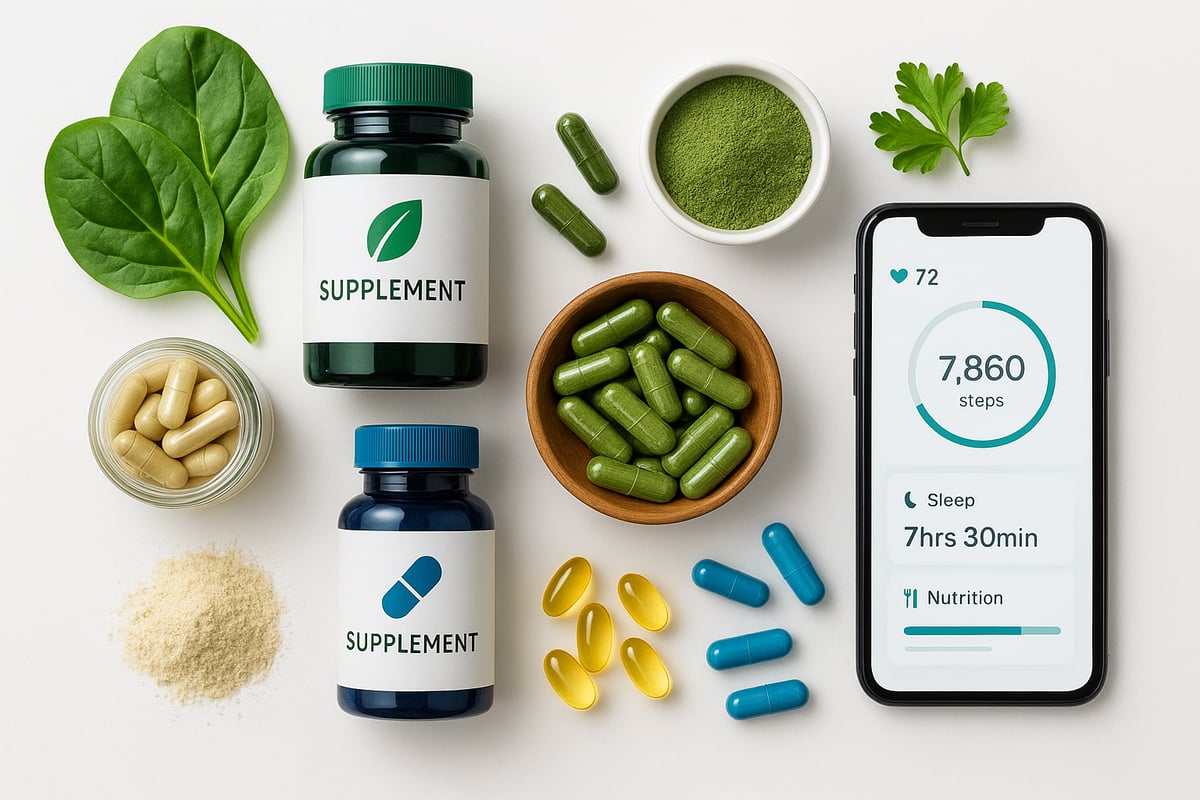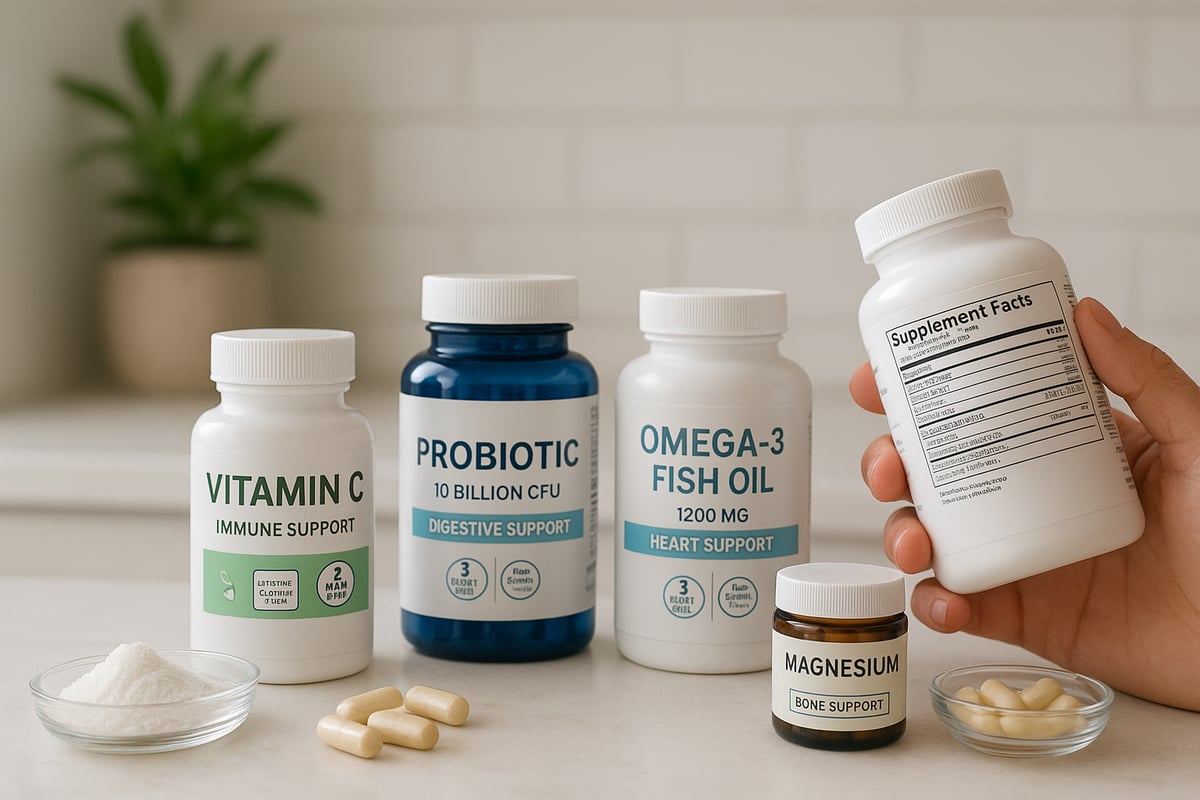Wellness Health Supplements Guide: Your Path to Better Living 2025
Are you ready to unlock a new level of well-being in 2025? The right wellness health supplements can be a game-changer for your vitality, resilience, and long-term health.
In this guide, we dive into the latest science, uncover the benefits, and share practical steps for making smart supplement choices. You will discover the trends shaping the future, learn how to spot quality products, and get expert advice for building a regimen that fits your life.
Take the first step toward better living. Explore actionable strategies, find out what works, and start taking control of your wellness journey today.
The Evolving Landscape of Wellness Health Supplements in 2025
The global market for wellness health supplements is on a remarkable trajectory, with projections placing its value beyond $230 billion by 2025. This explosive growth is shaped by shifting consumer priorities and a broader understanding of preventive health. According to recent global dietary supplements market growth projections, factors such as an aging population, heightened focus on longevity, and increased health awareness are fueling unprecedented demand for these products.

Aging demographics are one of the central forces behind the surge in wellness health supplements. As more people seek to maintain vitality and independence into their later years, the importance of targeted solutions for immunity, cognitive health, and stress management is growing. Personalized health is also a key driver, with consumers demanding products tailored to their unique genetic profiles, lifestyles, and health needs.
Major trends shaping the industry in 2025 include the rise of adaptogens like ashwagandha for stress resilience, nootropics for cognitive support, probiotics for gut health, and a significant shift toward plant-based supplements. The preference for natural, sustainable ingredients is influencing both product development and consumer choice. Plant-based offerings are not only perceived as cleaner but often align with broader wellness and ethical values.
Technological innovation is transforming the way wellness health supplements are formulated and delivered. Advances such as enhanced bioavailability, targeted delivery systems, and clean-label ingredients ensure that nutrients are absorbed more efficiently and safely. For example, liposomal encapsulation is being used to improve the effectiveness of key vitamins and antioxidants, making supplementation more reliable and user-friendly.
The integration of digital health tools is another defining feature of the evolving landscape. Apps and wearable devices now help users track supplement intake, monitor health outcomes, and receive personalized recommendations based on real-time data. This digital shift empowers individuals to make informed decisions and adapt their routines for optimal results, further embedding wellness health supplements into daily life.
Regulatory standards and quality assurance measures are also advancing. Stricter guidelines, third-party testing, and increased transparency are becoming industry norms. Consumers are increasingly seeking products that carry certifications and clear labeling, prioritizing safety and efficacy. Notably, the popularity of supplements such as ashwagandha and NAD+ boosters continues to climb, reflecting the demand for evidence-based solutions that address stress and cellular health. According to the Nutrition Business Journal, 77% of adults used dietary supplements in 2023, and this figure is expected to rise as the market continues to expand.
Understanding the Science: How Supplements Support Wellness
Unlocking the true potential of wellness health supplements begins with understanding the scientific principles that guide their use. From essential nutrients to advanced functional ingredients, these supplements play a vital role in maintaining and enhancing overall well-being. By exploring how each component works within the body, you can make informed decisions that benefit your health journey.

The Role of Essential Nutrients
Wellness health supplements often begin with the basics: vitamins and minerals. These essential nutrients support core bodily functions, including immune defense, energy production, and cellular repair. When your diet falls short, supplements can bridge the gap to optimal health.
Many adults experience deficiencies, particularly in vitamin D and magnesium. Research shows up to 42% of adults may lack adequate vitamin D, which can impact mood stability and bone strength. Magnesium deficiency is also widespread and may lead to fatigue or muscle cramps.
To address these issues, experts recommend routine assessments and, if needed, targeted supplementation. The recommended daily intake for vitamin D, for example, ranges from 600 to 800 IU for most adults. Wellness health supplements containing these nutrients can help restore balance and prevent deficiency-related health challenges.
A proactive approach to nutrition ensures your body receives the building blocks it needs for resilience and longevity. By understanding which nutrients are most commonly lacking, you can use wellness health supplements to maintain a strong foundation for well-being.
Functional Ingredients and Their Benefits
Beyond basic nutrients, wellness health supplements now feature a range of functional ingredients designed to address specific health goals. Adaptogens like ashwagandha and rhodiola help the body adapt to stress and maintain hormonal equilibrium. Nootropics, such as bacopa and citicoline, are gaining popularity for supporting memory, focus, and mental clarity.
Gut health is another area of rapid innovation. Probiotics and prebiotics promote a balanced microbiome, influencing immune function and inflammation regulation. Clinical trials have shown that probiotic supplementation can reduce symptoms of irritable bowel syndrome by as much as 40%.
Omega-3 fatty acids, found in fish oil and algae-based supplements, offer well-documented support for heart, brain, and joint health. For those interested in a deeper dive into the research, you can explore the evidence-based benefits of nutraceuticals, which highlights the science driving these innovations.
As new ingredients continue to emerge, wellness health supplements remain at the forefront of personalized, targeted wellness strategies. The synergy between these functional compounds and core nutrients empowers individuals to address their unique needs effectively.
Personalized Nutrition and Supplementation
Personalization is redefining the approach to wellness health supplements. Genetic makeup, lifestyle habits, and environmental factors all influence how your body processes nutrients. As a result, a one-size-fits-all solution is no longer ideal.
Advancements in digital health tools enable individuals to receive tailored supplement recommendations based on DNA analysis and comprehensive health assessments. For example, DNA-based supplement plans can identify specific vitamin or mineral needs, ensuring optimal absorption and efficiency.
Personalized supplement packs are now widely available, simplifying the process of integrating multiple nutrients into a daily routine. Digital apps allow users to track supplement intake, monitor progress, and adjust regimens according to changing goals or health markers.
By embracing this personalized approach, you can maximize the effectiveness of wellness health supplements and avoid unnecessary or redundant products. Continual monitoring and adjustment ensure your regimen remains closely aligned with your evolving health needs.
Choosing Quality Supplements: What to Look for in 2025
Selecting quality wellness health supplements in 2025 requires a discerning approach. With an ever-growing market and evolving standards, understanding what sets a superior product apart is key to supporting your health goals. Let’s break down the essential factors every informed consumer should consider.

Ingredient Transparency and Sourcing
When choosing wellness health supplements, ingredient transparency is crucial. Consumers are increasingly seeking clean-label products, which means supplements free from artificial additives, non-GMO, and organically sourced whenever possible.
Reading the supplement label helps you identify not only the active ingredients but also any hidden fillers or allergens. Look for brands that clearly list every component, including excipients and sources of raw materials. The Clean Label Project’s findings on heavy metals in popular supplements highlight the importance of scrutinizing product content for safety.
To compare transparency, use a simple checklist:
| Criteria | What to Look For |
|---|---|
| Active Ingredients | Clearly listed, with amounts per serving |
| Fillers/Additives | Minimal, with all disclosed |
| Allergen Information | Clearly stated (soy, dairy, gluten, etc.) |
| Sourcing | Non-GMO, organic, country of origin |
Prioritizing transparent wellness health supplements helps you avoid potential contaminants and ensures you get the intended benefits.
Certifications and Third-Party Testing
Certifications are a hallmark of quality in wellness health supplements. Reputable seals such as NSF, USP, or Informed-Sport indicate that a product has undergone rigorous third-party testing for purity, potency, and safety.
Why does this matter? Third-party testing verifies that supplements contain what the label claims, without harmful contaminants or undisclosed substances. For athletes and health-conscious individuals alike, this assurance is invaluable.
According to the Council for Responsible Nutrition, 68% of consumers now prefer supplements with third-party certification. These certifications are not just marketing tools, they are a sign of a brand’s commitment to your well-being.
Look for these badges on packaging or visit the manufacturer’s website for more details. In the world of wellness health supplements, third-party testing is a non-negotiable for many discerning buyers.
Formulation and Bioavailability
The effectiveness of wellness health supplements depends not just on what’s inside, but how well your body can absorb it. Advanced formulations are now designed to maximize bioavailability, ensuring your investment translates to real health benefits.
Delivery forms matter. Capsules, powders, liquids, and especially liposomal technology each offer unique advantages. For example, liposomal vitamin C has been shown to provide twice the absorption of traditional forms, making it a smart choice for those seeking measurable results.
Key formulation features to consider:
- Type of delivery system (capsule, powder, liquid)
- Presence of absorption enhancers (like black pepper for curcumin)
- Synergistic ingredient combinations for enhanced effect
Choosing the right formulation can significantly impact the effectiveness of your wellness health supplements, helping you achieve your health goals more efficiently.
Avoiding Common Pitfalls and Scams
The popularity of wellness health supplements has unfortunately led to a rise in misleading products and scams. Beware of overhyped claims, especially those promising miracle results without scientific backing. Proprietary blends that mask exact ingredient amounts are another red flag.
Counterfeit and adulterated supplements are increasingly found online. Always purchase from reputable brands or certified retailers, and check for tamper-evident packaging. Unverified testimonials and vague ingredient lists should also prompt caution.
For those seeking guidance on supplement choices, resources like Essential supplements for your 40s and 50s can provide research-based recommendations tailored to your age and wellness needs.
By staying vigilant and informed, you can avoid common pitfalls and ensure your wellness health supplements are both safe and effective.
Building Your Personalized Supplement Routine
Creating a personalized wellness health supplements routine is a strategic process that empowers you to target your unique health goals. By taking a tailored approach, you can enhance the effectiveness of your supplements and support long-term well-being.

Assessing Your Health Needs and Goals
The first step to a successful wellness health supplements plan is identifying your individual health priorities. Whether you want to boost your energy, support your immune system, improve sleep, or enhance cognitive function, defining your goals will shape your supplement choices.
Consulting a healthcare professional is highly recommended. They can help interpret lab results, medical history, and lifestyle factors to determine which nutrients you may lack. Some individuals benefit from self-assessment tools that track diet, symptoms, and overall well-being. These tools highlight potential deficiencies and guide your supplement selection.
For example, you might discover low vitamin D levels or insufficient magnesium intake. Addressing these gaps with targeted wellness health supplements can make a noticeable difference in your daily vitality. Regularly reassessing your needs ensures your regimen evolves as your health changes.
Integrating Supplements into Your Daily Life
Making wellness health supplements a consistent part of your day is essential for optimal results. Start by developing a supplement schedule that fits seamlessly into your routine. Many people find success by pairing supplement intake with established habits, such as breakfast or evening wind-down.
Using a pill organizer, smartphone reminders, or digital apps can help maintain consistency. These tools reduce the risk of missed doses and simplify tracking. For additional strategies, the article on maintaining your supplement regime provides practical tips for adherence and long-term success.
Pay attention to timing and potential interactions. Some wellness health supplements are best absorbed with food, while others may need to be spaced apart from certain medications. Document your routine to identify what works best for your lifestyle and health objectives.
Monitoring Results and Adjusting Your Regimen
Tracking the effects of wellness health supplements is crucial for measuring progress and making informed adjustments. Keep a daily journal or use a digital tracker to record supplement intake, energy levels, sleep quality, and any side effects.
Monitoring key health markers, such as lab values or symptom changes, helps you identify improvements or areas needing attention. If you notice positive trends, continue your current regimen. However, if side effects occur or progress stalls, consult a healthcare provider about adjusting dosages or switching products.
Regularly reviewing your supplement strategy ensures it remains aligned with your evolving health goals. Updating your wellness health supplements plan in response to new information keeps your regimen both effective and safe.
Expert Insights: Evidence-Based Supplement Strategies for 2025
Staying informed about the latest research helps you optimize your wellness health supplements routine. Many experts now recommend supplement stacking, which involves combining products with complementary effects, such as pairing magnesium with vitamin D for enhanced absorption.
Cycling supplements—periodically pausing or rotating products—can prevent tolerance and maximize benefits. Leading nutritionists emphasize the importance of periodic reevaluation, especially as new research emerges and your health needs shift.
Quotes from experts highlight that personalization and flexibility are key to long-term success with wellness health supplements. By staying proactive and informed, you can continuously refine your approach for optimal vitality and resilience.
Safety, Side Effects, and Regulatory Considerations
Choosing wellness health supplements is a significant step toward better health, but safety must always come first. With a rapidly growing supplement market, understanding potential risks and regulatory standards is essential for making informed decisions.
Recognizing Side Effects and Interactions
Although wellness health supplements are widely used, they are not free from possible side effects. Some common reactions include digestive discomfort, headaches, or allergic responses. These issues may arise from individual sensitivities or from combining supplements with prescription medications.
Certain ingredients can interact with blood thinners, blood pressure drugs, or even over-the-counter pain relievers. For example, St. John's Wort may reduce the effectiveness of oral contraceptives. Excessive intake of vitamins like vitamin A or minerals such as iron can cause toxicity, leading to serious health complications. Always review the ingredient list and dosing instructions before adding new products to your regimen.
Consulting Healthcare Professionals
Before starting any new wellness health supplements, consult with a healthcare provider, especially if you have existing health conditions or take medications. Healthcare professionals can assess your unique needs and help prevent adverse reactions. They may also recommend lab tests to check for deficiencies or monitor for potential interactions. This collaborative approach ensures that your supplement routine complements your overall health plan, reducing the risk of unintended effects.
Regulatory Guidelines and Market Oversight
Regulation plays a crucial role in ensuring the safety and quality of wellness health supplements. Agencies like the U.S. Food and Drug Administration (FDA), Therapeutic Goods Administration (TGA), and European Food Safety Authority (EFSA) have updated guidelines for supplement manufacturing and labeling in 2025. These regulations require manufacturers to follow good manufacturing practices, ensure accurate labeling, and report adverse events.
Transparency and third-party testing are increasingly common, giving consumers more confidence in their purchases. As discussed in Recent trends in dietary supplements, market growth has prompted stricter oversight, helping to protect consumers from unsafe or counterfeit products.
Special Considerations and Reporting Adverse Events
Certain populations require extra caution when using wellness health supplements. Pregnant or breastfeeding women, seniors, and individuals with chronic illnesses may be more susceptible to side effects or drug interactions. For example, excessive iron supplementation in children can be toxic, while too much vitamin A during pregnancy may increase the risk of birth defects.
If you experience unexpected symptoms after taking a supplement, stop use immediately and seek medical advice. Reporting adverse events to regulatory authorities, such as the FDA’s MedWatch program or equivalent agencies in your region, contributes to public safety and helps improve product standards.
By staying informed and vigilant, you can enjoy the benefits of wellness health supplements while minimizing risks. Prioritize quality, consult professionals, and remain proactive about your health.
As you’ve seen throughout this guide, understanding your unique health needs is the first step toward making smarter decisions about supplements and wellness in 2025. Choosing quality products formulated for your stage of life—like those created by Dr Roderick Mulgan in New Zealand—can make all the difference in supporting your vitality, immunity, and overall wellbeing. If you’re ready to take a more personalized approach to healthy ageing, I invite you to discover your healthy ageing profile. Let’s take the next step on your path to better living, together.

